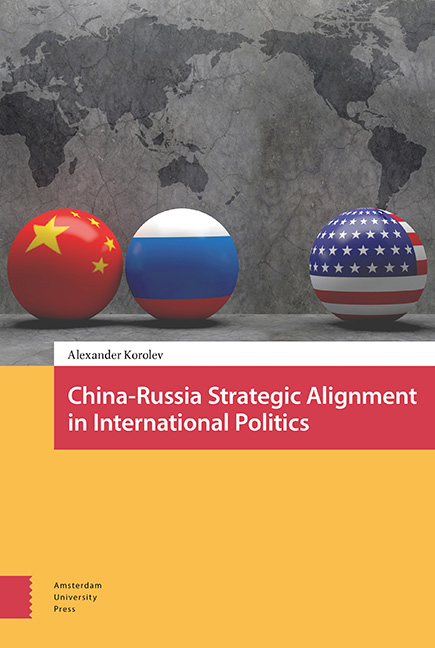Book contents
- Frontmatter
- Dedication
- Table of Contents
- List of Figures and Tables
- Acknowledgments
- 1 Introduction: The Elusive Nature of China–Russia Relations and the Need for Theory
- 2 The Ordinal Model of Strategic Alignment
- 3 Military Cooperation: Approaching Alliance
- 4 Alignment Incentives: The Three Balances
- 5 Robustness Check: Economy and Diplomacy
- 6 Comparative Mapping: US–India and China–Russia Alignments
- 7 Conclusion: Empirical Findings and Theoretical Implications
- Index
7 - Conclusion: Empirical Findings and Theoretical Implications
Published online by Cambridge University Press: 07 October 2022
- Frontmatter
- Dedication
- Table of Contents
- List of Figures and Tables
- Acknowledgments
- 1 Introduction: The Elusive Nature of China–Russia Relations and the Need for Theory
- 2 The Ordinal Model of Strategic Alignment
- 3 Military Cooperation: Approaching Alliance
- 4 Alignment Incentives: The Three Balances
- 5 Robustness Check: Economy and Diplomacy
- 6 Comparative Mapping: US–India and China–Russia Alignments
- 7 Conclusion: Empirical Findings and Theoretical Implications
- Index
Summary
Abstract
This concluding chapter takes stock of the empirical and theoretical findings presented in the previous chapters. Empirically, it summarizes the key features and the trajectory of post-Cold War China–Russia strategic cooperation and predicts its future development in the context of the evolving international environment. Theoretically, the chapter discusses the importance and future development of the theoretical model of alignment formation offered in this book. It highlights the significance of theorygrounded knowledge and discusses how the framework can be applied to other cases of interstate strategic cooperation, including formal alliances and informal alignments, both bilateral and multilateral, to understand their nuances, functional features, and development prospects. It also revisits the phenomenon of China–Russia relations and its significance for understanding the formation and development of interstate alliances.
Keywords: China–Russia relations, alliance, alignment
As stated at the beginning of the introductory chapter, this study is driven by two analytical goals – one empirical and one theoretical. The empirical goal is to assess, as accurately as possible, and explain the upward trend in post-Cold War China–Russia relations. In order to achieve this goal, the study also compares the case of China–Russia alignment with that of US–India alignment to highlight its strengths and weaknesses and assess how it fares vis-à-vis a comparable case. The theoretical goal is to develop a theory-grounded alignment framework and corresponding measurements that draw on the case of China–Russia alignment but are also general enough to travel across different cases, allowing comparative assessments. The below discussion summarizes research outcomes regarding both goals.
China–Russia relations: an ever-consolidating strategic alignment?
The central empirical finding that challenges the existing assessments is that the high level of China–Russia strategic cooperation is not an ad hoc phenomenon. It is not a knee-jerk reaction to the deterioration of US–Russia relations in the aftermath of the Ukraine Crisis or growing US–China tensions in Southeast Asia and beyond. Instead, it is the outcome of a consistent consolidation of China–Russia cooperation since the end of the Cold War. There have been ups and downs in the relationship, such as the temporary stagnation in China–Russia military-technical cooperation in the mid-2000s and the occasional suspension of regular Russia–China Mixed Intergovernmental Commission meetings on Military-Technical Cooperation.
- Type
- Chapter
- Information
- China-Russia Strategic Alignment in International Politics , pp. 189 - 198Publisher: Amsterdam University PressPrint publication year: 2022



